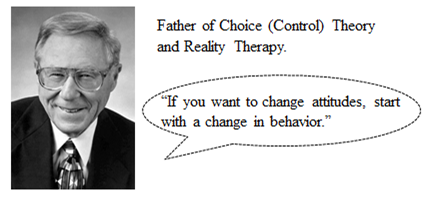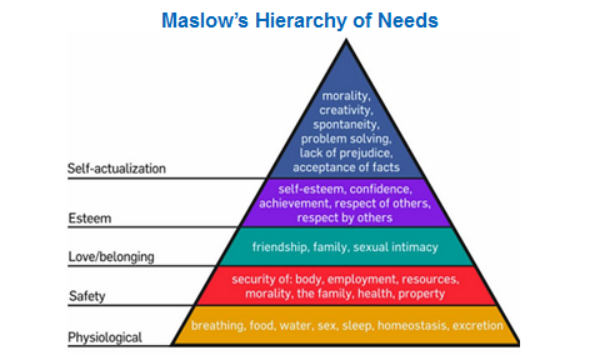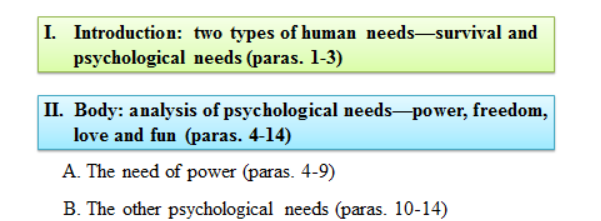Text Analysis: The Needs That Drive Us All
 知识点一
知识点一
I. Warming up
(1)Do you believe human actions are driven by human needs?
(2)What do you think are these basic human needs? (3)Are these needs exclusively human?
II. Background
Author: William Glasser
His life:
Born in Cleveland, Ohio.
Chemical engineer at age 19, a clinical psychologist at 23 and a physician at 28.
Psychiatric training at the Veteran’s Administration Centre in UCLA.
Founded The Institute for Reality Therapy in 1967.
He has devoted his life to educating people about his beliefs and working directly with school
counsellors, administrators and teachers.
His achievement:

Human Needs Theories
1.Reality Therapy
People need to meet the basic need of love (giving and receiving) and the need of finding
self-worth.
Success comes with giving and receiving love throughout one’s life.
Schools are responsible for helping students to fill these needs.
These two needs must be met so that students can find an identity for themselves.
Students that fail to meet these needs, and thus not find their identity, will suffer, withdraw
from society, be lonely and frustrated.
Choice (Control) Theory (1)
The basic needs that drive us all:
To survive (and be secure)
To belong and be loved
To gain power (to gain and keep respect)
To be free
To have fun
Choice (Control) Theory (2)
Behavior is never caused by a response to an outside stimulus (situation or person).
Behavior is a constant attempt to satisfy one or more of our five basic needs.
These basic needs are thought to be innate (we are born with them).
We choose all that we do and we are responsible for the choices we make.
2.Maslow’s Hierarchy of Needs
In 1943, American psychologist Abraham Maslow (1908-1970) proposed the theory that behavior is
determined by a various of needs. He organized these needs into five categories and then
arranged the categories in a hierarchy.
In the pyramid-shaped chart, the most basic needs are at the bottom of this category, and the
more advanced needs are toward the top. According to him, people try to satisfy the lower-order
needs before they move on to the next level higher up.

3.Discussion
How is Glasser’s understanding of humans’ basic needs different from Maslow’s?
How would you like to interpret the differences?
III. Text analysis
(I)Theme
Human beings are driven by five basic needs, some of which are shared by other animals,
and the need for power is uniquely human.
As to young students, they should increase their self-awareness of their humanness so as
to better deal with their problems.
(II)Structure

(III)Detailed analysis
Part I: Two Types of Human Needs (paras. 1-3)
Survival and Psychological
1.What are the needs that drive us all? Are they of the same status?
2.Are these needs all uniquely human needs? What in the author’s opinion is the uniquely human
need?
3.How does the author prove that these needs are basic and therefore we are born with no choice?
4.How does the author categorize the five basic needs?
a) Simple survival needs: hunger, thirst, and sexual desire
b) Non-essential psychological needs: belonging, freedom,power and fun
Part II: Analysis of Psychological Needs (paras. 4-14)
A. The Need of Power (paras. 4-9)
(1) What purposes does power serve?
Neither good nor bad

(2) Why is it difficult for most of us to accept that the need of power is a basic human need?
a) The preaching of those in power that humans should be humble proves a great success.
b) We hope, by supporting them, those in power would share a little of what they have with us.
(3) Do you agree with William Glasser? Any examples?
(4) Glasser says that “to be satisfied with how others have treated us for a week would seem
like an eternity.” Is this the case? Why or why not?
(5) How do you understand that “We are intensely competitive.”? Do you agree?
(6) How do you understand that power, as a genetic need, has no morality? Do you agree?
(7) Why do people usually have a low opinion of power?
Part II: Analysis of Psychological Needs (paras. 4-14)
B. The Other Psychological Needs (paras. 10-14)
1. Freedom
(1) What is the author’s opinion about the relationship between freedom and power as well as belonging?
(2) Do you agree with Glasser? Why or why not?
(3) How do you understand freedom? That is, what do you want from freedom?
2. Fun
(1) What is fun?
a) About laughter, play and entertainment
b) Best part of any job
c) Not serious but important
d) Spontaneous
e) A balance to misery
f) A catalyst
(2) What point does the author try to make in Paragraph 12?
(3) How do you understand that the ability to make choices is the precondition to fun?
(4) How do you understand that fun is also about making choices? Do you agree?
(5) Why is fun a basic need?
Fun, as a powerful genetic incentive to long-term dedication to learning and learning, decides
how we can survive.
(6) How is fun important in your life?
(7) How is fun related to power, freedom and belonging?
IV. Reinforcement:
Discussion
(1) What are the features shared by all these five basic needs?
(2) What do you think should be the appropriate relationship between these five basic needs?
(3) Why does the author argue that power and fun are both basic human needs?
